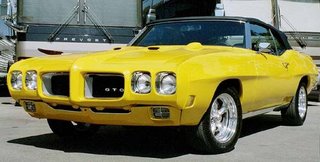
I used to have a fascination with cars. It was a fascination that I couldn't afford when I was younger... and now when I'm at an age where I might possibly be able to afford it, it's no longer practical. WWJD? That is... What Would Jesus Drive?
My dream car: A 1970 Pontiac GTO (nicknamed, "The Judge"), which came standard with Ram Air III 400 V8 engine. It got 9-11 miles per gallon. Would pass everything on the road except a gas station. But it only existed in my dreams.
My first car (1981): a 1967 VW Type-1, a/k/a the Beetle, gave $800 for it. It was made the year BEFORE the gas cap was placed on the outside of the car, so I had to raise the trunk (which was where the hood was on most cars) to put gas into the car... which I'm sure amused many folks who drove by. However, from it I learned how to work on VW's and Porsches, which were basically the same air-cooled engine design. It had a 1300cc engine, and I think I once got it to a top speed of 82 mph. It suffered an untimely fate when a steering tie rod snapped at highway speed, and we flipped and rolled numerous times off of the highway. Remarkably, my brother and I along with a close friend walked away.
My next car (1982), which my brother and I shared: a 1972 Chevy Nova (also bought for $800). Before you say that I finally got my muscle car, it wasn't a Super Nova... it was a 4-door sedan, with a 194 c.i. in-line 6 cylinder. It was without a doubt the ugliest car in town; it was army green with a white top (looked like an Army vehicle), had "chrome moon" hubcaps, and was nicknamed "the General" at my high school as a result. It suffered from a bad water pump, which led to a cracked engine block on a frosty October morning in 1985. But, hey - it ran for three years. We got our $800 worth.
The next car (1985): a 1972 Chevy Impala (bought for $850). Now it WAS a muscle car, even though it was a four-door... and eight people could sit comfortably in it (and often did). A 350 V8 engine made that thing purr. But no matter what I did to it, it only got 8-10 mpg. Downhill.
After that... reality kicked in. My wife and I had a series of small economy cars. We now own two cars: a 2002 Nissan Maxima (a really nice car, btw), and a 1993 Ford Ranger truck. Both are super dependable. The Maxima gets about 28 mpg (not bad). My truck gets around 19 (ugh). Gas is nearly $3 a gallon.

Pastoral work necessitates a lot of driving. Both of my cars are paid for... as is a 1993 Yamaha Virago 750VX motorcycle. It gets 45 mpg. Guess what I'm riding a lot these days?
Riding the bike used to be my method of relaxation on a day off, or on a night like this evening when my wife and I rode around looking at blooming dogwood trees and azealeas. But these days, weather permitting, it's becoming more of a mode of transportation. I mean, from an environmental and stewardship point-of-view, 45 mpg vs. 19 mpg?
Some are speculating that gasoline may hit $4 a gallon this year. I suspect a lot of our ways will have to change... including our American love affair with automobiles. Will we be able to afford to drive our SUV's, our muscle cars? Will we have to look at car pooling? Mass transit? None of this is new to Europeans or Far Easterners. One day, we will need to run our automobiles on less powerful and efficient, but more economical and environmentally friendly, engines. Can we handle that?
I don't adapt well to sudden change, so I guess I'm trying to prepare myself early. So my hair may be a little messed up from wearing a helmet, and there may be a few dead bugs on my pant legs. But I suspect those changes are going to be tiny compared to future changes our nation and world will face in the years to come.
When the Chinese say, "May you live in interesting times," it's intended as a curse. I suspect rising gas prices may just be the tip of the interesting times ahead. Life isn't static - our faith calls us to be ready for change. In fact... our faith calls us to be
agents of change.
Can we change our ways... and the ways of the world? Even if it means I'll never get to own my '70 GTO?
Pax,
Sky+
P.S. Would Jesus ride a Harley or a metric cruiser?







